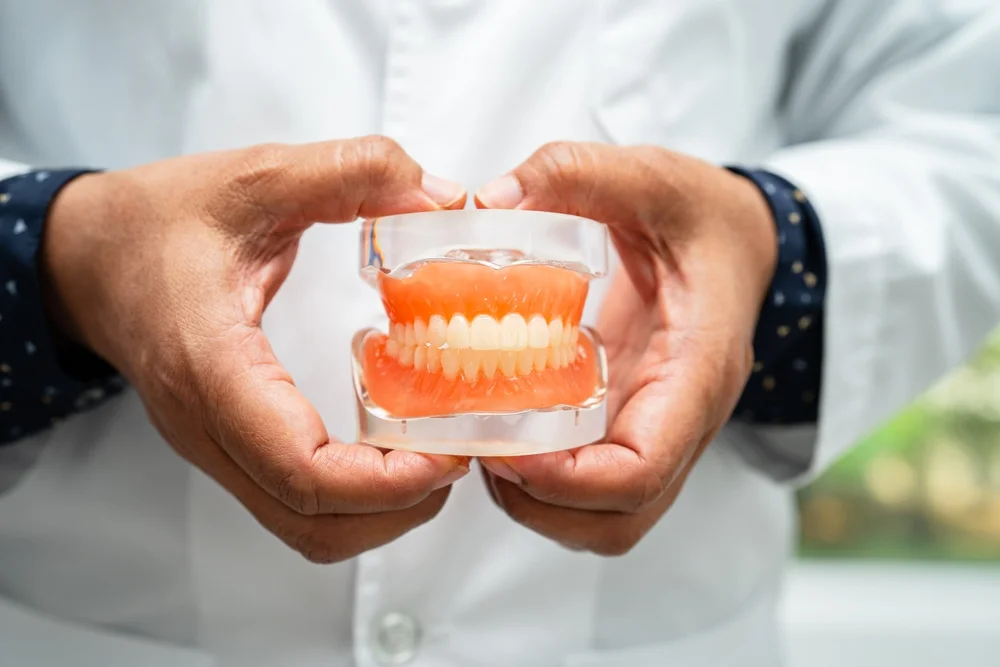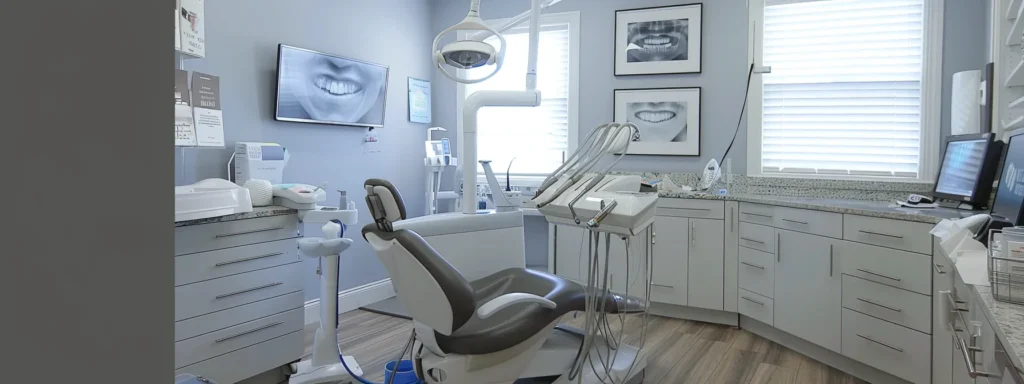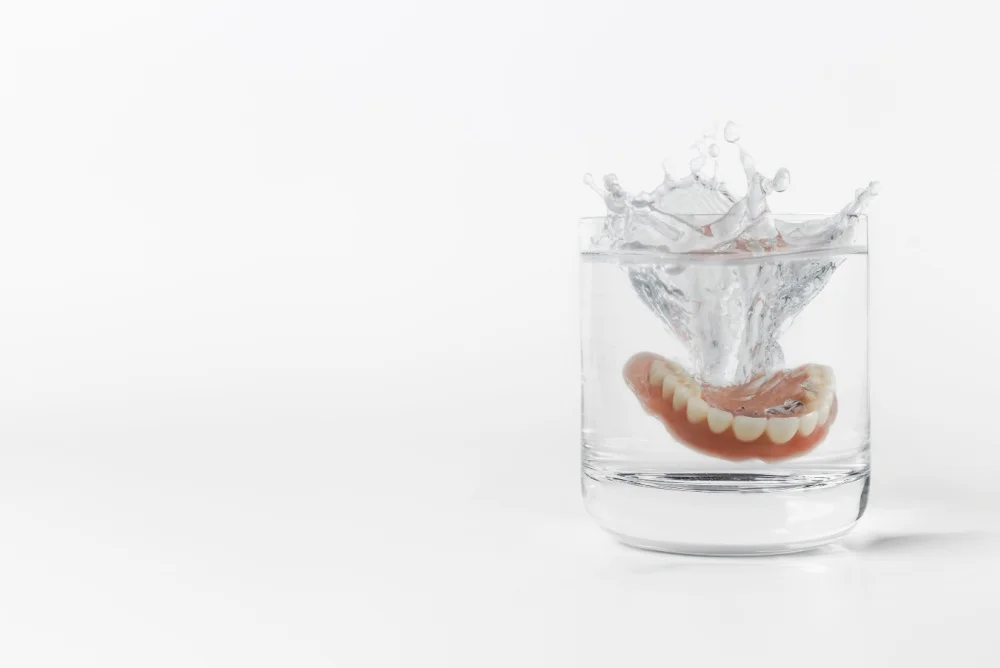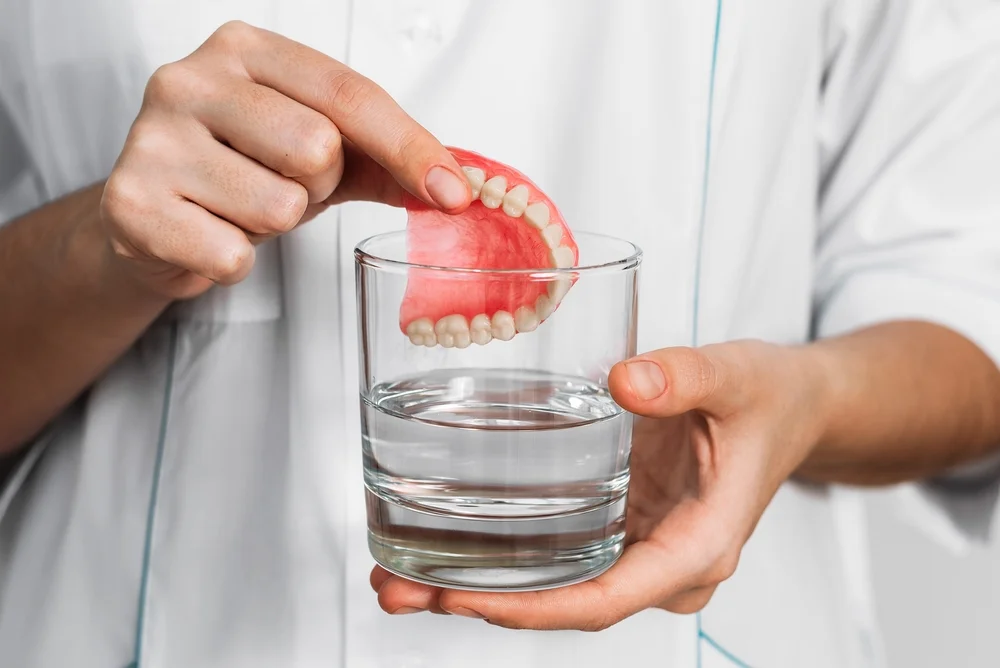The staff provided excellent care, were nice to talk to and made a very comfortable visit. They were able to provide fillings to several chipped teeth with short notice while visiting Phoenix from out of country. Both myself and my dentist back home agreed the quality of the fillings were well done, and the colour was a great match. Highly recommend for the great staff and professional work done.

Do you have implant-supported dentures and want to make sure they last for many years while keeping your mouth healthy? Taking proper care of your implant-supported dentures is like taking care of a valuable car – with the right maintenance, it runs smoothly for decades!
Dr. Jeremy Chan, a Phoenix native practicing in Tempe, brings advanced expertise in implant dentistry and prosthetic maintenance. With his specialized training, Dr. Chan helps patients develop effective daily routines that keep their implant-supported dentures functioning perfectly.
Maintaining your implant-supported dentures correctly involves much more than just keeping your smile looking good – it’s about ensuring functionality, comfort, and your overall oral health. Unlike traditional dentures that you remove each night, implant-supported dentures stay in your mouth permanently, which means they need care techniques similar to natural teeth but with some important differences.
Understanding Your Unique Denture System
Think of your implant-supported dentures like a sophisticated piece of machinery with different parts working together. Each part needs specific care to keep the whole system running smoothly.
There are several different types of implant-supported dentures, including bar-retained and ball-retained systems, and each has specific maintenance requirements. Bar-retained dentures use a metal bar that connects several implants, with clips on the denture that attach to this bar. Ball-retained dentures use individual ball-shaped attachments on each implant that snap into corresponding sockets.
Each type requires slightly different cleaning techniques. Bar-retained systems need careful cleaning around the bar itself and the clips, as food particles and bacteria can accumulate. Ball-retained systems require attention to both the ball attachments on the implants and the socket mechanisms.
Key Differences Between Systems:
| System Type | Key Components | Special Care Needs |
| Bar-Retained | Metal bar, retaining clips | Clean bar thoroughly |
| Ball-Retained | Ball attachments, sockets | Clean ball joints, replace worn parts |
| Locator System | Locator abutments, caps | Monitor cap wear |
| Magnetic System | Magnetic keepers, plates | Keep magnets clean |
The materials used in your dentures also influence the care techniques and products that work best. Modern implant-supported dentures might include acrylic teeth, porcelain teeth, and titanium components that each respond differently to different cleaning methods.
Regular inspection helps you identify normal wear patterns versus signs of damage that need professional attention. Learning to recognize how your dentures should look and feel allows you to spot potential problems early.
Preventing Serious Implant Complications
One of the most important reasons to maintain excellent care is preventing peri-implant diseases, which can threaten both your dentures and your overall oral health.
Peri-implant diseases like peri-implantitis represent infections that can compromise the stability of your dentures. When harmful bacteria accumulate around implant sites, they cause inflammation and damage to surrounding gum tissues and bone structures. This can cause pain, swelling, bleeding, and bad breath while gradually weakening the foundation.
The consequences of untreated peri-implant diseases can be devastating. Advanced infections can cause severe bone loss around implants, which may eventually lead to complete implant failure. When implants fail, the treatment often involves removing the failed implants, treating the infection, and starting over.
Warning Signs Requiring Immediate Attention:
- Persistent bad breath that doesn’t improve with cleaning
- Bleeding around implant sites during brushing
- Swelling or tenderness around implants
- Changes in how your dentures fit or feel
- Loose or wobbly feeling in your dentures
- Pus or discharge around implant areas
Prevention through excellent daily hygiene and regular professional monitoring represents the most effective approach. Establishing a thorough daily cleaning routine that removes bacteria before they can establish infections provides the foundation for long-term implant health.
Early detection and treatment typically involves relatively simple interventions like improved home care techniques, professional deep cleaning, or minor adjustments. When caught early, these problems can often be resolved completely.
Creating Your Daily Care Routine
Developing a consistent daily care routine forms the foundation of successful long-term implant denture maintenance.
Proper daily cleaning prevents bacterial buildup that can cause infections, bad breath, and damage. Unlike natural teeth that have some natural defense mechanisms, implant-supported dentures rely entirely on your daily care.
The cleaning products and tools you choose make a significant difference. Soft-bristled brushes specifically designed for dentures clean effectively without scratching surfaces. Non-abrasive cleaning products formulated for dentures remove bacteria without weakening the materials.
Essential Daily Care Routine:
- Remove dentures carefully and rinse with lukewarm water
- Brush all denture surfaces with soft-bristled denture brush
- Clean denture attachments and mechanisms thoroughly
- Brush implant sites and surrounding gums gently
- Rinse mouth with antimicrobial mouthwash if recommended
- Store dentures safely when not wearing them
Specialized cleaning techniques for different components ensure that every part receives appropriate attention. The denture teeth and gum portions need gentle but thorough brushing. Metal attachments may require different cleaning approaches than soft tissue components. Implant sites where the posts emerge need special attention with gentle brushing and possibly specialized cleaning tools.
Consistency in your daily care routine produces much better results than sporadic intensive cleaning sessions. Daily attention prevents problems and makes each cleaning session quicker.
Protecting Your Investment Through Smart Choices
The lifestyle choices you make every day significantly impact the longevity and performance of your implant-supported dentures.
Dietary choices affect both the cleanliness and structural integrity. Hard foods like ice cubes, popcorn kernels, or hard candies can chip or crack denture teeth, while sticky foods like caramel can dislodge attachments. Very hot foods and beverages can cause some denture materials to expand and contract.
Harmful habits like smoking and excessive alcohol consumption can significantly damage both your dentures and the oral tissues that support them. Smoking stains denture materials, weakens gum tissues, and significantly increases the risk of peri-implant infections. Alcohol can dry out your mouth, reducing the natural cleansing action of saliva.
Lifestyle Choices That Protect Your Dentures:
- Choose softer foods that are gentler on denture materials
- Cut hard foods into smaller pieces
- Avoid using dentures as tools to open packages
- Stay well-hydrated to maintain healthy saliva production
- Limit staining substances like coffee, tea, and red wine
- Quit smoking to reduce infection risks
Using your dentures appropriately prevents unnecessary stress and damage. Your dentures are designed for eating and speaking, not for opening packages or cracking nuts. Being mindful helps them last longer.
Product selection requires attention to ingredients that effectively clean without causing damage. Some toothpastes contain abrasive ingredients that can scratch denture surfaces. Choosing products specifically formulated for dentures ensures effective cleaning while protecting the materials.

Recognizing When You Need Professional Help
Understanding when to seek professional dental care helps prevent minor issues from becoming major problems.
Changes in comfort, fit, or function often indicate developing problems that need professional evaluation. Any persistent discomfort around implant sites, especially if accompanied by swelling, bleeding, or bad breath, suggests possible infection that requires immediate professional attention.
Visual changes provide important clues about potential problems. Chips, cracks, or worn areas in denture teeth can harbor bacteria and may indicate that repairs are needed. Discoloration, swelling, or unusual growths around implant sites require professional evaluation.
Signs Requiring Professional Attention:
- Persistent pain or discomfort around implants
- Bleeding from implant sites during normal care
- Swelling or redness around implants
- Loose or wobbly feeling when chewing
- Bad breath that doesn’t improve with cleaning
- Visible damage to denture teeth or attachments
Delaying professional care often leads to more complex and expensive treatment needs. Early intervention involves relatively simple adjustments, professional cleaning, or minor repairs.
Regular professional monitoring even when you’re not experiencing any problems helps catch potential issues before they cause symptoms. Professional examinations include checking implant stability, evaluating denture fit, and cleaning areas that are difficult to reach.
Maximizing Benefits from Professional Care
Regular professional checkups and cleanings provide benefits that extend far beyond what you can achieve with home care alone.
Professional examinations use specialized tools to identify potential problems that may not be visible during your daily care routine. Dental professionals can detect early signs of implant complications, evaluate the condition of denture attachments, and assess the health of surrounding tissues.
Professional cleaning services remove bacterial deposits and calculus that can accumulate despite excellent home care. Specialized instruments allow dental hygienists to clean areas that are difficult or impossible to reach.
Benefits of Regular Professional Care:
- Early detection of problems before they cause symptoms
- Professional cleaning that removes stubborn bacterial deposits
- Adjustments to maintain optimal denture fit
- Monitoring of implant stability and tissue health
- Education about new care techniques and products
Professional adjustments and maintenance help keep your dentures functioning optimally as your mouth changes over time. Minor adjustments to denture fit, replacement of worn attachment components, and professional polishing can restore optimal function.
Your Path to Long-Term Success
Successful long-term care requires commitment to daily attention, regular professional monitoring, and lifestyle choices that support optimal oral health. Dr. Jeremy Chan’s expertise in implant dentistry ensures that you have all the support necessary for decades of denture success.
Embracing daily care practices as a normal part of your routine creates the foundation for excellent long-term results. Consistency in daily maintenance prevents most common problems while making each cleaning session quicker.
Professional guidance provides the expertise and monitoring necessary to navigate the complexities of denture maintenance. Regular dental visits allow for early detection and treatment of potential problems while providing ongoing education.
At our Tempe practice, we’re committed to providing the education, support, and professional care that helps every patient achieve long-term success. Our comprehensive approach combines advanced technical expertise with personalized attention.
Frequently Asked Questions
How often should I clean my implant-supported dentures?
You should clean your implant-supported dentures daily using soft-bristled brushes and non-abrasive cleaners specifically designed for dentures. Most patients clean their dentures twice daily, similar to brushing natural teeth, with additional cleaning after meals when food particles accumulate around the implant sites.
Tempe Dentistry
480-897-2274
4427 S Rural Road, Suite 2
Tempe, AZ 85282
https://tempe.dental/
What should I do if I notice discomfort around my denture implants?
If you experience discomfort, swelling, bleeding, or any unusual sensations around your denture implants, contact your dental office immediately. These symptoms often indicate developing infections or other complications that require prompt professional attention to prevent serious damage.
Can I use regular toothpaste to clean my implant-supported dentures?
Regular toothpaste is too abrasive for denture materials and can create scratches that harbor bacteria while damaging the precision attachments. Instead, use cleaning products specifically formulated for dentures that effectively remove bacteria and food particles without damaging the materials.
Dr. Chan’s Arizona dental license number is 10020, verified through the Arizona State Board of Dental Examiners and the NPI Registry. Every whitening treatment follows current American Dental Association (ADA) best practices to ensure safety, comfort, and effectiveness.
The information on this page is provided to help you understand general dental care and the preventive services we offer. It’s not a substitute for professional diagnosis or individualized treatment. Every patient’s needs are different, and your dentist will evaluate your oral health before recommending any specific care or procedure. (For personalized guidance, please schedule an appointment with a licensed dental professional.)
Related Articles
Dentures with Implants ~ Denture Costs and Financing ~ Denture Care and Maintenance ~ Dentures Types and Benefits ~ Affordable Dentures



